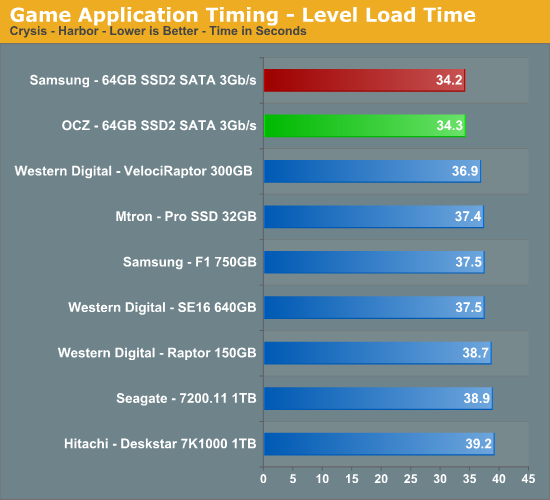64GB SSD on the Desktop: Samsung and OCZ go mainstream
by Gary Key on May 15, 2008 11:30 PM EST- Posted in
- Storage
Game Level Load
This test centers on the actual loading of a playable level within our game selections. Our application timer begins when initiating the level load process and ends when the game play screen is visible.


In Company of Heroes, the separation between the test group is around 3 seconds. Our VelociRaptor is the quickest mechanical drive in this test but loses out to the SSD drives. In Crysis, we see a separation of five seconds between the drives with the Samsung/OCZ drives once again scoring a win. Subjectively, the SSD drives seemed to offer quicker transitions between levels as we extended the game play length. Also, the Crysis level load dropped to 28.37 seconds on the Samsung/OCZ drives on subsequent loads if we did not clear the pre-fetch folder; comparatively, the WD VelociRaptor dropped to 33.09 seconds.
Nero Recode
Our encoding test is quite easy - we take our original Office Space DVD and use AnyDVD to copy the full DVD to the hard drive without compression, thus providing an almost exact duplicate of the DVD. We then fire up Nero Recode 2, select our Office Space copy on the hard drive, and perform a shrink operation to allow the entire movie along with extras to fit on a single 4.5GB DVD disc. We leave all options on their defaults except we turn off the advanced analysis option. The scores reported include the full encoding process and is listed in seconds, with lower numbers indicating better performance. We delete each image after use.

The superior write speeds of the VelociRaptor and Mtron drives are indicative of a test that features large data blocks in a sequential pattern. The Samsung/OCZ drive performs very well and is around 21 seconds faster than the previous generation Samsung 64GB drive.
WinRAR 3.71
Our WinRAR test measures the time it takes to compress our test folder that contains 444 files, 10 folders, and 602MB of data. While the benchmark is CPU intensive for the compression tests, it still requires a fast storage system to keep pace with the CPU. A drive that offers excellent write performance can make a difference in this benchmark.

This test relies on the CPU and the burst rate of the storage system. The results in this test surprised us; we fully expected the drive to score even or slightly worse than the Mtron drive due to slower write speeds. We ran the test several times and even tried a new image but the results stayed the same.










38 Comments
View All Comments
Ender17 - Friday, May 16, 2008 - link
I'm not surprised. The 334 MB platter drives are fast.Just look at this review of the Samsung F1
http://www.storagereview.com/samsungs_spinpoint_f1...">http://www.storagereview.com/samsungs_spinpoint_f1...
Beats the old ADFD Raptors across the board. And I don't know why anyone expects the Seagate drives to be fast, they're consistently at the bottom in performance.
Griswold - Friday, May 16, 2008 - link
Why? It has the same platter density.Noya - Friday, May 16, 2008 - link
Yes, and I'm using my $59 WD 640gb just for games (the first 150gb of it anyway) and the load time is very quick compared to my old 250gb 7200.8 sata.PlasmaBomb - Friday, May 16, 2008 - link
Thats probably because your old drive was nearly full and speed drops off towards the inside of the platter.semo - Saturday, May 17, 2008 - link
aren't new data stored on the inside tracks of the platter and then move outwards?Zefram0911 - Friday, May 16, 2008 - link
Is anyone disappointed in the load times for games? Only beats my old raptors by 3-5 seconds.Calin - Tuesday, May 20, 2008 - link
Load time for game levels is mostly sequential - I suppose game developers take pains in having the load level as a big sequential read (in which case solid state drives have no advantage). I am surprised about the file compression tests (which have reads and writes from different areas of the disk)retrospooty - Friday, May 16, 2008 - link
"Is anyone disappointed in the load times for games? Only beats my old raptors by 3-5 seconds."Ya, I have to wonder what the various gaming tests like "Vantage HDD Gaming" are measuring. SSD's consistantly blow HDD's out of the water scoring 300 to 500% higher on those tests (Gary's article is consistent with others I have seen)... Then real world game load and level load times are only like 5% higher.
What gives?
lemonadesoda - Wednesday, May 21, 2008 - link
It's a very easy answer: file compression. The data files (e.g. maps and textures) on disk require a lot of CPU processing before they are "ready to play".A trick used in the days of Quake engines was to unzip the .pk3 files. Then delete the .pk3. This improved load times enormously.
Perhaps game designers should have an install option to "full unzip game asset data on install". It would require a lot more HDD space. But load times would shrink.
JarredWalton - Friday, May 16, 2008 - link
It's the nature of the benchmark: access a large amount of data in a fairly random fashion and don't do ANY processing of the data, and you end up with the theoretical performance of the hard drive. That's pretty much what IPEAK-based testing accomplishes.Games have been mostly bottlenecked by CPUs, GPUs, and RAM for a long time - load times with 2GB RAM are substantially faster than with 1GB of RAM, and even 4GB of RAM can show some speedup in certain newer games. The reason for the CPU bottleneck on level loads is that most games compress data in order to conserve space; decompressing all the textures and models and such takes a fair amount of CPU power, to the point where the hard drives probably only need to sustain around 15-25MB/s.